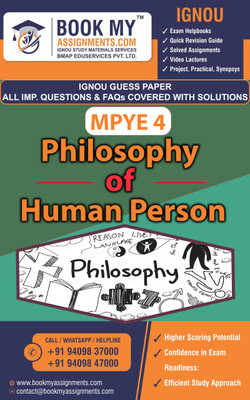IGNOU MPYE 4 Philosophy of Human Person | Guess Paper | Important Question Answer | Master of Arts (Philosophy)(MAPY)(Paperback, BMA Publication)
Quick Overview
Product Price Comparison
Introduction to Philosophy of Human Person: Understanding the scope and significance of the philosophy of human person as a branch of philosophy concerned with the nature, essence, and significance of human existence.The Concept of Personhood: Exploring different philosophical perspectives on what it means to be a person, including theories of personal identity, selfhood, consciousness, and agency.Metaphysical Perspectives: Examining metaphysical questions about the nature of human beings, including debates about the mind-body problem, free will and determinism, dualism and monism, and the nature of the soul.Existentialism: Studying existentialist philosophy and its emphasis on individual freedom, authenticity, responsibility, and the search for meaning in an inherently meaningless universe, including key figures such as Kierkegaard, Nietzsche, Sartre, and Camus.Human Nature and Essence: Reflecting on questions about human nature, essence, and purpose, including debates about essentialism vs. existentialism, the nature of human flourishing, and the search for the meaning of life.Ethical Perspectives: Considering ethical questions related to the nature of the human person, including theories of moral development, virtue ethics, deontological ethics, consequentialism, and the ethics of care.Political Philosophy: Exploring political theories and ideologies that address questions about human personhood and social organization, including theories of justice, rights, democracy, liberalism, communitarianism, and feminism.Philosophy of Mind: Investigating theories of the mind and consciousness and their implications for understanding the nature of human personhood, including debates about the mind-body problem, consciousness, intentionality, and mental causation.Personal Identity: Examining theories of personal identity and continuity over time, including psychological continuity theories, bodily continuity theories, and narrative identity theories.The Self and Subjectivity: Reflecting on questions about the nature of the self, subjectivity, and self-awareness, including debates about the nature of selfhood, the relation between self and other, and the nature of intersubjectivity.


